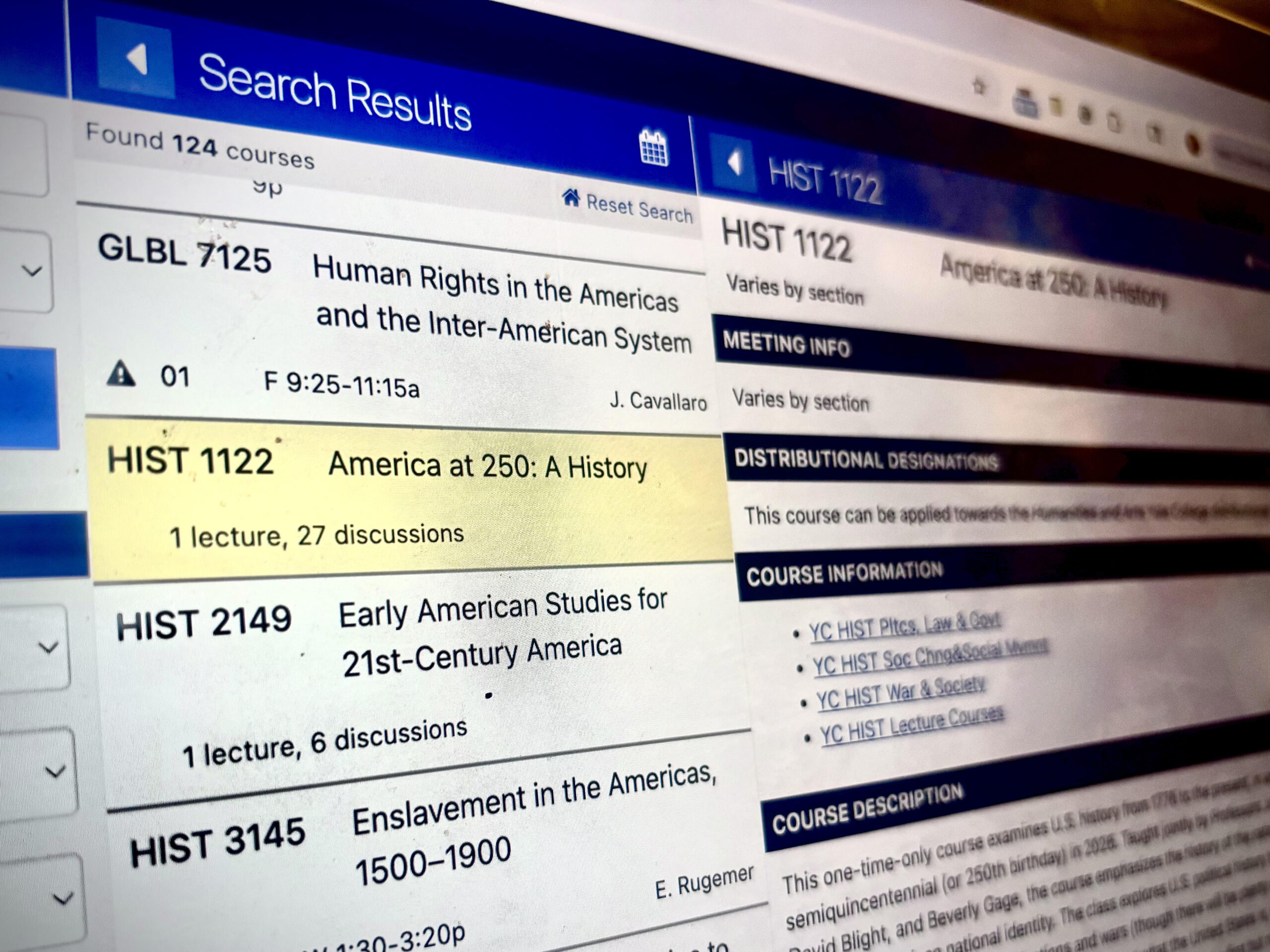Economics courses remain most popular as ‘America at 250’ joins top three
As introductory microeconomics topped the list for at least three years in a row, the one-time-only “America at 250” ranked second.

Baala Shakya, Photography Editor
After undergraduates cemented their new course schedules by the end of add/drop period on Friday, the Economics Department yet again leads the list of most popular courses — unusually accompanied by a one-time-only history course.
Excluding laboratory courses that accompany other classes, Yale College’s three most popular courses are “Introductory Microeconomics,” “America at 250” and “Game Theory,” with enrollments of 529, 380 and 375 students, respectively.
“It’s fun to teach these big classes. I get students from a wide variety of backgrounds and majors and schools, and these students are just great,” professor Benjamin Polak, who teaches “Game Theory,” wrote to the News. “I always have to pinch myself to remember that I am actually getting paid to do this.”
Professor Cormac O’Dea, who teaches “Introductory Microeconomics” — which also topped last fall’s list with 496 students — wrote to the News that he anticipated the higher enrollment this semester given the larger size of the class of 2029 compared to the class of 2028.
Considering that expected increase, his team started planning the course in April, hiring teaching assistants and peer tutors on an earlier timeline. The course now offers 28 discussion sections and roughly 60 drop-in office hours per week, O’Dea wrote.
Jasmine Guo ’29, who takes “Introductory Microeconomics,” said O’Dea successfully captures students’ attention despite the large class size. She especially appreciates O’Dea’s encouragement that each student asks at least one question over the course of the semester, she said.
Alongside the historically popular economics courses, “America at 250” ranks as the second-most-enrolled course this semester. The course, part of the DeVane lecture series, is being offered to undergraduates and members of the public.
Beverly Gage ’94 — one of the three professors teaching “America at 250” — wrote to the News that they “always expected this to be a large course.”
Despite its instant popularity among students, enrollment in the course underwent a notable decline by the end of the add/drop period, with 104 students dropping the course during that window. While 484 students were enrolled in the course on Aug. 27, 380 students are enrolled now.
Will Mahoney ’27, who initially enrolled in “America at 250” due to his interest in American history and the prominence of its professors, told the News that he dropped the course due to a scheduling conflict.
Mahoney said that the large nature of the course meant that experience in discussion sections might be inconsistent, with some sections that “aren’t as focused and aren’t as engaged.” He added that he still plans to watch the lectures online.
Gage wrote that the “deliberately intensive” workload of the course — with substantial weekly readings, three papers and a final exam — may have led some students to opt out.
She added that “fluctuations are to be expected in a course like this.”
While “Game Theory” saw a decrease in enrollment this semester compared to last fall — from 475 to 374 — it remains the third most popular course among undergraduates.
Polak, who teaches the course, attributed this decline to the department’s addition of a new spring version of the course, which 154 students enrolled in.
Nic Spangler-Torres ’28, a prospective Ethics, Politics and Economics major taking “Game Theory,” said Polak engages the large class with open-ended questions, polls and games that enhance the understanding of class material.
“His lecture is consistently the most entertaining class of my week,” Spangler-Torres said.
The third most popular course last fall semester — “Criminal Minds,” which had 450 students — is not being offered this semester.
Professor Arielle Baskin-Sommers, who teaches the course, wrote to the News that the course’s availability typically changes from year to year.
“I typically offer The Criminal Mind every other year and hope to be able to continue with that schedule in the coming years,” she wrote. “However, I can never guarantee the schedule because it will always depend on department needs and other commitments.”
Economics is the most popular major at Yale.
Correction, Sept. 11: An earlier version of the graph showing the 10 most popular courses in Yale College misstated the sixth through tenth most popular courses due to errors in counting the enrollment numbers for courses with multiple course codes or separately listed sections. Those courses are, in order, “Probability Theory,” “Calculus of Functions of Several Variables,” “Calculus of Functions of One Variable II,” “University Physics” and “University Physics for the Life Sciences” — not “University Physics for the Life Sciences,” “Principles of Cell Biology,” “Organic Chemistry,” “Biochemistry and Biophysics” and “Introduction to Psychology.”







